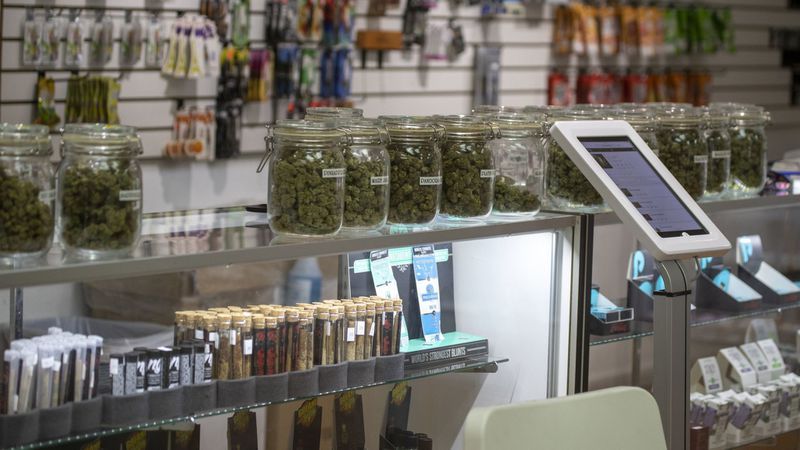A view of an illegal marijuana dispensary after the Department of Water & Power shut off its utilities in Wilmington, Calif. on May 14. (Allen J. Schaben / Los Angeles Times)
When advocates for legalizing marijuana in California drafted Proposition 64, they made an important concession to win the support — or at least minimize the opposition — of local government and law enforcement groups: Cities and counties, they said, would be allowed to ban marijuana-related businesses entirely if they chose to.
That guarantee of local control was a central promise of the proposition. But now, some legislators want to reverse it and force local governments to accept pot stores against their will. It’s an unfair bait-and-switch tactic that should not be approved.
Under Proposition 64, which was approved less than three years ago, local governments may not prohibit adults from growing, using or transporting marijuana for personal use, but they can refuse to license cannabis companies in their jurisdiction.
And that’s exactly what many have done. Roughly 75% of local governments have outlawed pot shops.
That, however, has created a problem, in the eyes of some Proposition 64 supporters. One of the measure’s goals was to transform the marijuana industry from a largely uncontrolled, unchecked, underground operation into a highly regulated marketplace served by legitimate, taxpaying companies. But because of the local bans on retail pot shops, there are still many eager cannabis customers living in places where legal marijuana is not easily available — and many sellers are therefore continuing to operate illegally in the shadows.
In other words, the local bans are seen by some people as encouraging black market operators who don’t pay taxes or necessarily follow the new law’s regulations, such as those on pesticides and packaging. The state has sent more than 3,000 cease-and-desist letters to illegal pot businesses.
To address the issue, Assemblyman Phil Ting (D-San Francisco) has introduced Assembly Bill 1356, which would require cities and counties where more than 50% of voters supported Proposition 64 to permit at least one marijuana retail license for every six liquor licenses issued to bars or restaurants in their jurisdiction, or one pot shop for every 15,000 residents, whichever is fewer.
A city would be allowed to ban marijuana businesses only if it puts a measure to do so on the ballot and voters pass it.
Ting and his supporters argue that AB 1356 is necessary because local elected officials are ignoring the will of the voters by not licensing more pot shops.
But they don’t know that. Proposition 64 promised local control, and many of the people who voted for it may have thought that was a critical part of the proposition.
Even people who support legalizing marijuana can have legitimate qualms and hesitations about the details of permitting cannabis operations. Where are the appropriate locations for marijuana businesses? Should there be a cap on the number of pot shops allowed? Because marijuana remains illegal under federal law, cannabis businesses can’t get banking services so they are all-cash enterprises, which come with crime risks and tax collection challenges.
The concession allowing local governments to control licensing was an acknowledgement of those challenges, and an attempt to ease peoples’ concerns over how legalization could affect their communities. The ballot argument was perfectly clear that the measure “preserves local control,” and the voter information guide analysis stated that “cities and counties could also completely ban marijuana-related businesses.”
Those promises should not be so lightly undone so soon after Proposition 64 went into effect. If marijuana sellers are operating without licenses in areas where they are banned, then the solution is for state and local law enforcement agencies to be aggressive in shutting them down.
There is a separate fight underway over whether cities and counties can ban deliveries of legal marijuana to adult residents in their jurisdiction. The state’s Bureau of Cannabis Control says no, Proposition 64 doesn’t let cities ban delivery services from traveling on public roads to their customers. Two dozen cities are suing the state, arguing that the right to ban marijuana businesses includes the right to ban deliveries.
They can fight that one out. But there should be no confusion on the right of cities and counties to ban pot businesses from setting up shop within their borders. It’s far too soon for lawmakers to consider overturning one of the key promises of Proposition 64.


